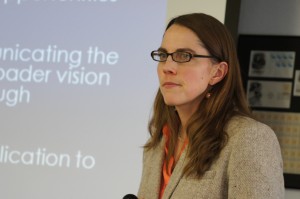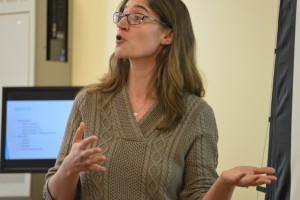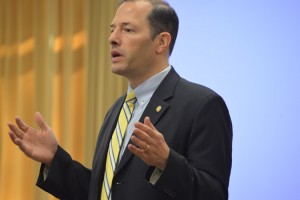CommPACT Community Schools Collaborative Transitions into Focusing on Parent Engagement
Two CommPACT community members, Christina Lapierre from CREC Two Rivers Magnet High-Middle and Callie Boston-Gardner from CREC, participated with a “Friday Cafe” networking session at the UConn campus. The focus was on using an on-line tool to gather information on links among parents and between families and teachers.
Increased family and community involvement are among the successes Bassick High School in Bridgeport has experienced since becoming part of the Connecticut CommPACT Community Schools Collaborative.
“The message to the masses is that ‘it takes a village’ for effective education reforms and improvements to occur,” says Bassick Interim Principal Kathryn Silver. “I cannot make the necessary changes alone. But when experts in the CommPACT initiative come together with parents, students, staff, administrators, and the community at large, we are able to move mountains.”
Based out of UConn’s Neag School of Education and directed by Michele Femc-Bagwell, assistant professor in residence in Neag’s Department of Educational Leadership, the seven-year-old CommPACT program matches communities, parents, administrators, children, and teachers with experts and best practices designed to improve education and opportunities for students and family members alike.
“It’s all about empowerment,” Femc-Bagwell says. “We impart to parents and staff the importance of owning their school’s challenges and solutions. We work with them to identify the best research-based models and frameworks to achieve their goals.”
From ‘The School’ to ‘Our School’
Among other achievements, the program’s comprehensive and coordinated efforts toward school turnaround have led to the creation of a Parent Resource Center at Bassick High, which provides parents, grandparents, students, and others in the community with computer training, resume help, English as a Second Language support, immigration assistance, life balance and parenting skills, and a wide variety of other services. More than 2,500 visits have been logged in the past two years.
Similar successes have been achieved at the three other schools currently working with CommPACT, which include John Barry Elementary School in Meriden, Robert J. O’Brien STEM Academy in East Hartford, and West Side Middle School in Waterbury.
One of the newer schools in the program, O’Brien STEM Academy recently used CommPACT’s resources and experience with successful outcomes to organize and facilitate a “visioning event” that involved more than 60 parents, teachers, administrators, and community members brainstorming how these groups can work together to advance students’ educational opportunities through family and community engagement over the next five years. A Family Resource Center with services similar to Bassick’s was also established, but expanded to include a food pantry supported by area partner Whole Foods.
“CommPACT has led to families making strong school connections and better understanding the intricacies of the educational process,” says East Hartford Superintendent of Schools Nathan D. Quesnel. “With the help of CommPACT, there’s been an important terminology shift and change at O’Brien. Parents used to visit ‘the school,’ but they now visit ‘our school.’ CommPACT is helping us make a difference in the lives of children by bringing families into the classrooms, hallways, and cafeterias.”
This idea of inclusiveness — of bringing family members into schools to learn, volunteer, share skills, and participate in student learning as engaged partners and role models — is exactly what CommPACT is all about.
At each of the schools, a family and community cadre comprising community members, parents, administrators, teachers, and often students works with school staff to coordinate and implement projects and activities, guided by the resources of CommPACT partners.
“One of the many strengths of CommPACT is that we focus on fundamental family needs that parents and school staff identify as being essential to their community. The result is truly engaged families, whom we help by using the expertise of the partnership to find the resources they need, whether it be assistance in selecting and implementing evidence-based practices in governance, instruction, decision making, community involvement, or behavior management,” says CommPACT Family and Community Engagement Specialist Jocelyn Ault.
“We also survey parents’ interests and skills in an effort to connect their identified human capital in meaningful and important ways to curricular, extracurricular, and fundraising activities. Building relationships of trust and valuing the talents that parents bring to a school is a critical component of our work that also promotes social capital and builds community,” says Femc-Bagwell.
In addition to the Neag School, CommPACT partners include the American Federation of Teachers of Connecticut, Connecticut Education Association, Connecticut Federation of School Administrators, and Connecticut Association of Public School Superintendents.
Part of the Paradigm Shift
Parents and staff at West Side Middle School are currently working with CommPACT to improve communication internally with staff and externally with families. Also being supported by CommPACT is a Parent and Community Leadership Conference to take place May 1. Additional community partners working together to plan the event include: Naugatuck Valley Community College; the U.S. Department of Education-funded Waterbury GEAR UP program to improve college access and readiness; the City of Waterbury Department of Education/Title I; and Waterbury Bridge to Success partnership of local organizations, families and volunteers. The focus of the day will be to develop parents as leaders in improving students’ educational outcomes.
“With the help of CommPACT, our school has been transformed,” says West Side Middle School CommPACT parent liaison Griselle Myers. “We’re excited for even more opportunities to make the positive changes needed to affect the most important people we serve: our students.”
“Closing the achievement gap requires not just getting kids excited about learning, but whole families and communities. Especially in our urban areas, there are many parents who grew up without a lot of educational support and who, because of that, limited their dreams,” she says. “If through our Family Resource Centers we can help them achieve some of their goals — finish high school, save money, get a better job — they, in turn, will better understand how to help their children set and achieve their own goals and dreams. Every parent and community member also has a skill or gift that they can share.”
Buying into the idea that it takes entire communities, working together, to effectively educate students requires a complete paradigm shift. CommPACT values the importance of all stakeholders working collaboratively to achieve this goal.
by: Cindy Wolfe Boynton


 nversation with Representative Andy Fleischmann” this past November at the Storrs campus. As the chairman of the Education Committee of the Connecticut State Assembly, State Rep. Fleischmann (West Hartford) spoke about the future of education in Connecticut schools and how education policy research could better inform policy making in Hartford and beyond.
nversation with Representative Andy Fleischmann” this past November at the Storrs campus. As the chairman of the Education Committee of the Connecticut State Assembly, State Rep. Fleischmann (West Hartford) spoke about the future of education in Connecticut schools and how education policy research could better inform policy making in Hartford and beyond.